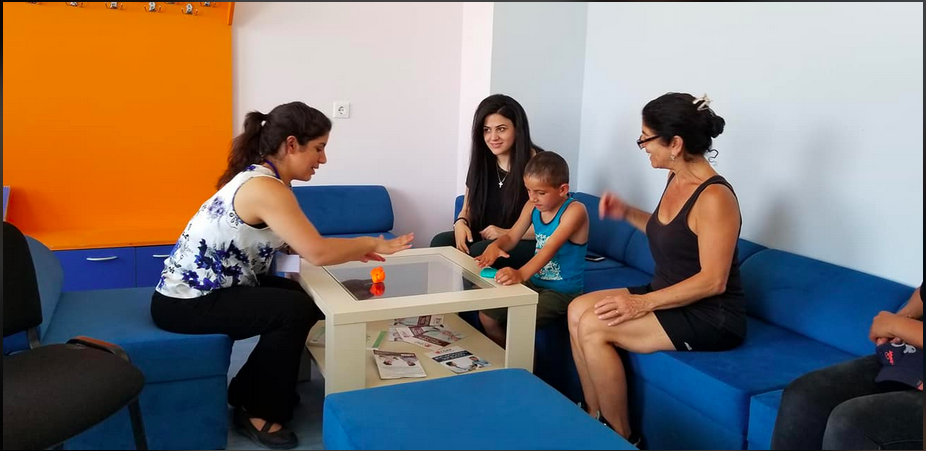
Proving Saroyan’s famous saying true about the power of Armenians to rebuild, a chance meeting over gumbo between two Armenians in New Orleans has grown into an international movement felt half a world away in the rehabilitation hospitals of Yerevan. Armineh Babikian and Alissa Bonjuklian realized how much they have in common over lunch while taking a break from presenting research and attending lectures at the 2019 American Occupational Therapy Association annual conference. They swapped stories about their experiences traveling to Armenia to provide necessary rehab services and helping to raise awareness of the field of occupational therapy, a form of therapy using exercises or strategies with the intent of enabling people to regain the ability to accomplish necessary tasks for daily life.
Bonjuklian shared her experience traveling to Armenia in 2018 with the Armenian American Health Professional Organization (AAHPO) annual medical mission alongside a doctor, dentist, OR nurse, and psychiatrist. The team, supported by a group of student volunteers, provided direct patient care to locals in need from the rural villages of northern Armenia. Bonjuklian also delivered a presentation for the Mikaelyan Institute’s rehab staff while gifting an array of therapy supplies and training the clinicians in their use.
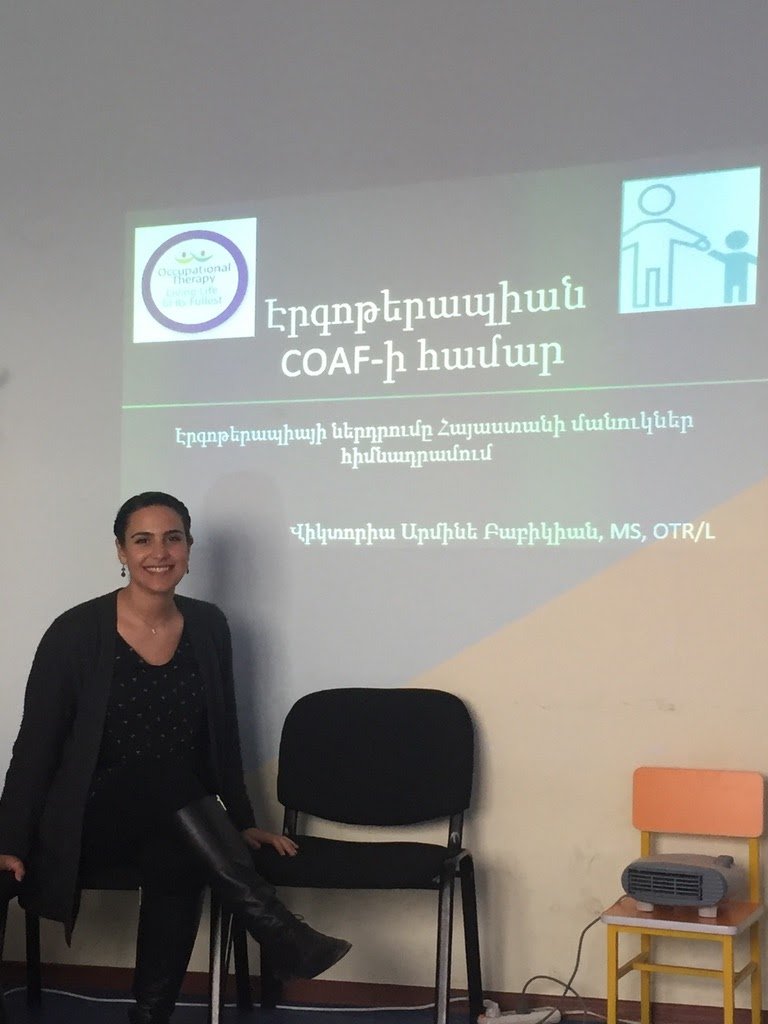
Babikian’s previous experience included volunteering with Children of Armenia Fund (COAF) as their first occupational therapist. She volunteered with Birthright Armenia during which she lived in Armenia for eight months providing occupational therapy services to children with disabilities in rural villages, created an occupational therapy guidebook and helped design the first student resource room for children with disabilities in a Yerevan public school. This led her to return each year to host workshops and training, and she saw a big interest for additional support in other rehabilitation topics which were not her specialty. She was also meeting diasporan professionals, like Bonjuklian, who wanted to get more involved with Armenia’s rehabilitation sector but were not as familiar with the local organizations providing these services. Explaining her motivation, Babikian said: “there was an interest from both sides, but no shared platform to get connected. So I created Therapists for Armenia to bridge the gap.”
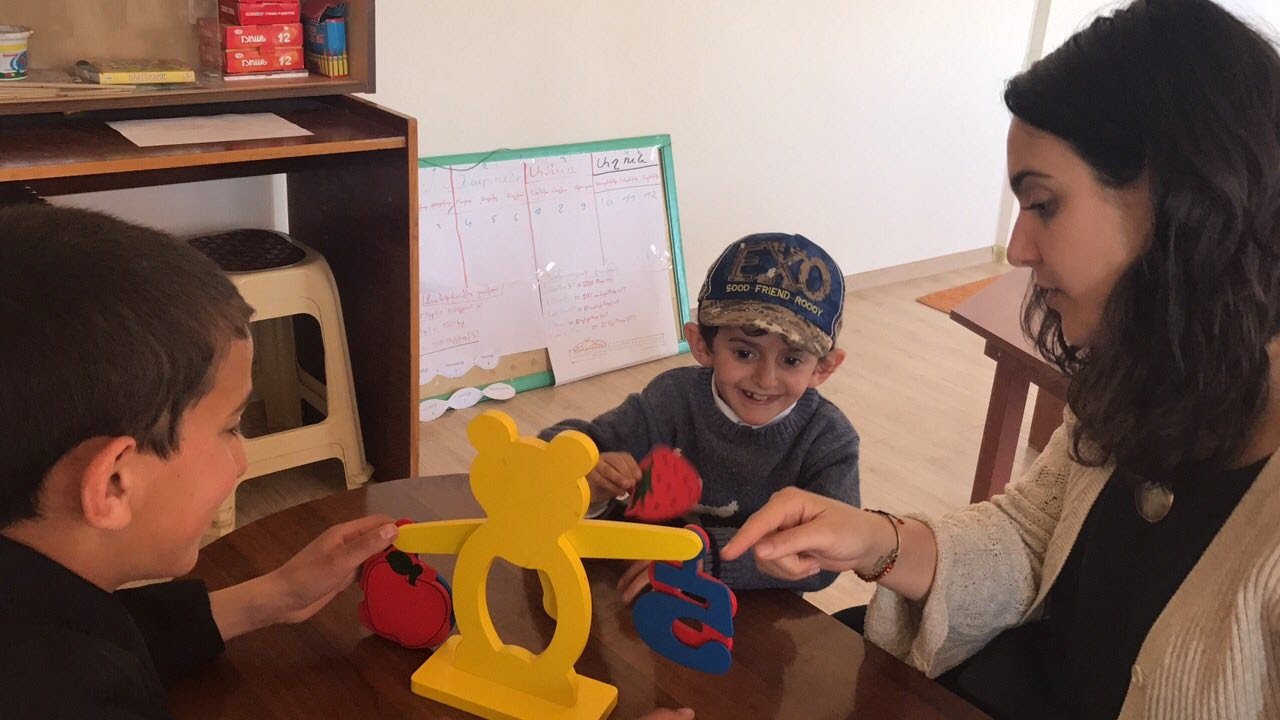
In 2019 Babikian founded Therapists for Armenia (TFA), an organization for occupational, physical and speech therapy professionals who share a passion for connecting with and supporting their Armenian communities. It has grown in such a short amount of time because there is a great deal of interest from both sides to nurture the interdisciplinary relationship and digitally exchange experience and clinical knowledge. Bonjuklian, meanwhile, has contributed to numerous TFA projects, starting close to home to support the Armenian Nursing & Rehabilitation Center of Emerson, New Jersey which was hit hard by the COVID-19 pandemic. Neither could foresee the other terrible tragedy on the horizon which would very soon make their field of work even more important to Armenians than it already was.
The war waged on the Armenians of Artsakh last fall by Azerbaijan has had devastating effects, with thousands killed and many more wounded and disabled. TFA immediately launched itself into addressing the new demand faced by Armenia’s rehab sector. Its focus became post-war rehabilitation for wounded soldiers and carrying out humanitarian efforts with rehab providers in Armenia. “The Armenian healthcare system was overwhelmed with COVID and war injuries. Pediatric therapists volunteered their spare time to help wounded soldiers. Rehab students were called in to work. There were many conditions that were unfamiliar to clinicians in Armenia. “I reached out to experts from top US universities and hospitals to share the latest evidence-based interventions with our Armenian colleagues to ensure our soldiers had the best possible outcome,” Babikian explained. This resulted in over 20 bilingual webinars and an extensive digital resource library with topics ranging from wound care and prosthesis fitting to treatment of burns and spinal cord and traumatic brain injuries. As a result of their post-war efforts, TFA was invited to join the World Health Organization (WHO) Rehabilitation Task Force for Armenia. “Now we are one of the leading diaspora organizations in the rehab training and education sector,” states Babikian.
Since the start of the war, TFA has also been working closely with Armenian-American Sports Medicine Coalition (AASMC) to mobilize professionals from abroad to share their expertise not just remotely, but on the ground in Armenia’s hospitals. This April, Bonjuklian became the first occupational therapist to volunteer on behalf of TFA and AASMC to provide in-person humanitarian support to clinicians and patients.
She was accompanied by Talin Mirzaei of Burbank, CA—an occupational therapy student and AASMC member who served as a full-time interpreter and mentee. Armenia’s Ministry of Health assigned the pair to a rehabilitation center that had not hosted outside clinicians in a long time. “We went in with open minds, asking how we could best serve them,” recalled Bonjuklian. “We got an overwhelming response from management and staff members to share the latest clinical knowledge.” Subsequently, Bonjuklian prepared two presentations on relevant clinical topics that she delivered to the rehab staff which were recorded and will be shown to clinicians working at other facilities as well. But Bonjuklian adds, “While we shared a great deal of knowledge, we also learned a lot from them. This information exchange was paramount to building a rapport and forging a lasting, ongoing relationship with these clinicians.”
Prior to her departure, with the help of friends, family, and her local Armenian community, Bonjuklian fundraised over $5,000, which was used to fund the mission including rehab supplies and equipment which was gifted to the patients she treated. Bonjuklian worked with soldiers who had survived explosions and gunshots causing loss of mobility due to shrapnel wounds throughout their bodies. She also worked with non-military patients seeking treatment for stroke and orthopedic injuries.
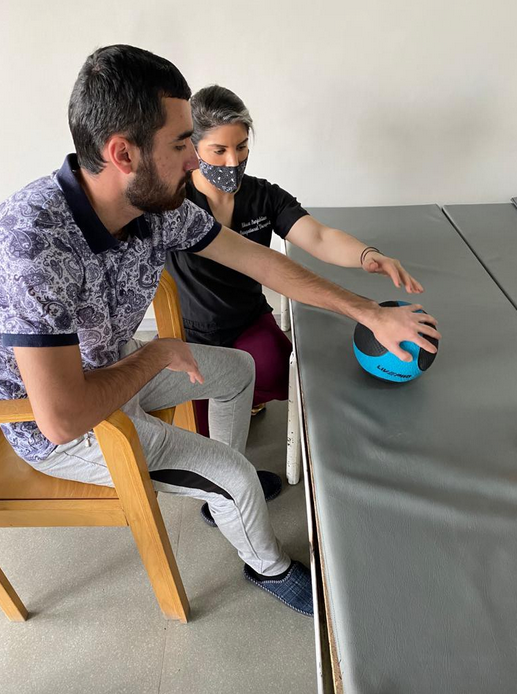
One soldier from Yerevan had undergone four surgeries and might require another in order to treat a wrist tendon which ruptured in an explosion. Bonjuklian worked with him on improving his wrist and hand functionality and trained him in a customized exercise program. He was given the tools he needed to continue the exercises at home after he was discharged from the facility. Another soldier, Aram, had sustained a gunshot wound to his left upper arm resulting in nerve damage. His goal is to be able to type again so he can continue school. Bonjuklian took baseline measurements of his range of motion, grip strength and pinch strength, training the staff clinicians how to use said devices and gifting them to the facility.
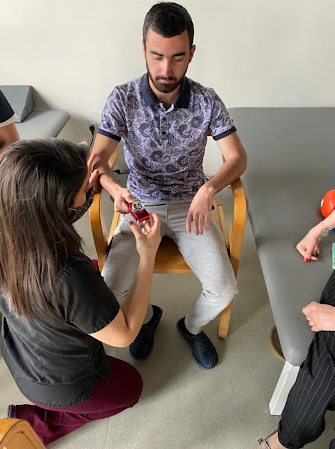
Three more rehab volunteers are set to arrive in Armenia this summer, including Babikian. In total, AASMC and TFA have helped recruit over 50 healthcare professionals to travel and volunteer in Armenia and Artsakh. There is still a great need for support in rehabilitation. In July, these organizations will be co-hosting a Post-Conflict Rehabilitation Virtual Symposium to further stimulate the development of the field, promote international awareness of the situation in Armenia and build local capacity. This will be the first post-war conference in Armenia for rehabilitation professionals. “There are other large-scale developments in the pipeline in coordination with the Ministry of Health and National Institute of Health,” added Babikian, “We want to support Armenian rehabilitation in the most sustainable way—by co-creating initiatives and supporting the leaders and advocates of rehabilitation in Armenia and Artsakh.”
In addition to instruction in therapeutic fields, TFA also seeks to promote accessibility and inclusion of people with disabilities and to foster their well-being through the services and support they provide. “The organization is growing rapidly,” said Babikian, “Our network expands to over eight countries, and we are on our way to becoming a non-profit. My dream is that Therapists for Armenia becomes a staple in the Armenian community for rehabilitation and disability support.”



Thank you Paul Sookiadin for your article ,Armineh Babikian is my daughter ,and and I know how many hours she spends virtually to make a Bridge between all kind of therapists professionals around the World ,specially diaspora Armenians and none Armenians to help develop better professionals in Armenia at the Rehabilitation Centers and the creation more Rehab Centers . (Pease next time use the first names with the last names ,she is not only Babikian in her family)
Respectfully Lolita Babikian ,NYC ,USA